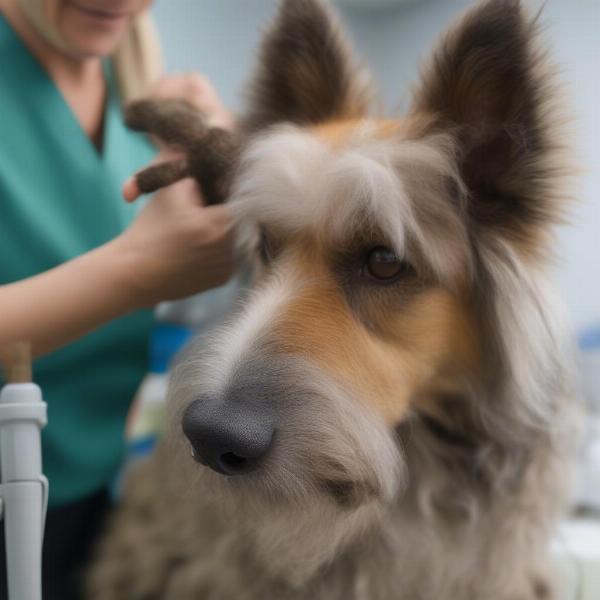The heartbreaking story of 175 dogs rescued from hoarders in Mississippi in 2011 serves as a stark reminder of the devastating consequences of animal hoarding. This large-scale rescue operation highlighted the complex issues surrounding animal hoarding, the challenges of rehabilitation, and the importance of responsible pet ownership. This article will delve into the details of this specific case, the psychology behind hoarding, and the vital role of animal welfare organizations in such situations.
The Mississippi animal hoarding case of 2011 shocked the nation. The sheer number of dogs found living in deplorable conditions brought the issue of animal hoarding to the forefront. The animals were discovered suffering from various ailments, including malnutrition, parasites, and untreated injuries. Many were fearful and unsocialized, reflecting the neglect they had endured. The rescue operation, a collaborative effort involving multiple animal welfare organizations, required extensive resources and unwavering dedication. The dogs’ road to recovery was long and arduous, involving medical treatment, behavioral rehabilitation, and ultimately, finding loving forever homes.
Understanding the Psychology of Animal Hoarding
What drives individuals to hoard animals? Hoarding is a complex mental health disorder characterized by the persistent difficulty discarding or parting with possessions, regardless of their actual value. In the case of animal hoarding, this manifests as an accumulation of animals, often exceeding the individual’s capacity to provide adequate care. Hoarders often believe they are rescuing the animals, genuinely believing they are providing a loving home. However, the reality is far from it, as the animals suffer from severe neglect and deprivation.
The Challenges of Rehabilitation
Rehabilitating rescued hoarded animals presents unique challenges. Many of the dogs in the Mississippi case were understandably traumatized and fearful of human interaction. Building trust and helping them overcome their fear required patience, expertise, and a deep understanding of animal behavior. Some dogs exhibited aggression or other behavioral issues as a result of their traumatic experiences, necessitating specialized training and intervention. The process often involves gradual desensitization and positive reinforcement techniques to help the animals adjust to a normal, healthy environment.
 Hoarded Dog Receiving Veterinary Care
Hoarded Dog Receiving Veterinary Care
The Importance of Early Intervention and Community Support
Preventing animal hoarding requires a multi-faceted approach. Early intervention is crucial, and community members play a vital role in identifying potential hoarding situations. Recognizing the signs, such as a strong animal odor emanating from a property, an unusually large number of animals, or visible signs of neglect, and reporting these concerns to animal control or local animal welfare organizations can make a significant difference. Education and awareness campaigns can also help educate the public about the dangers of animal hoarding and the importance of responsible pet ownership.
The Aftermath: Finding Forever Homes
The 175 dogs rescued in Mississippi faced a long road to recovery, but their stories ultimately had happy endings. Animal welfare organizations across the country rallied to provide medical care, rehabilitation, and ultimately, loving forever homes for these deserving animals. The outpouring of support from individuals and organizations demonstrated the power of compassion and the unwavering commitment to animal welfare.
Conclusion: A Call for Continued Vigilance
The Mississippi dog hoarding case of 2011 remains a poignant reminder of the devastating impact of animal hoarding. It highlights the importance of continuous vigilance, community involvement, and the critical role of animal welfare organizations in rescuing, rehabilitating, and rehoming animals in need. By understanding the complexities of this issue and working together, we can prevent future tragedies and ensure the well-being of all animals. Remember, responsible pet ownership involves not only providing adequate care for our own animals but also being aware of potential hoarding situations and taking action to protect animals in our communities.
FAQ:
-
What is animal hoarding? Animal hoarding is a complex mental health disorder characterized by accumulating a large number of animals, often exceeding the individual’s capacity to provide proper care.
-
What are the signs of animal hoarding? Signs include a strong animal odor, an unusually large number of animals, visible signs of neglect, and the owner’s reluctance to allow others inside their property.
-
How can I help prevent animal hoarding? Be vigilant and report any suspected cases to animal control or local animal shelters. Support animal welfare organizations and spread awareness about responsible pet ownership.
-
What happens to the animals rescued from hoarding situations? They receive medical care, behavioral rehabilitation, and are eventually placed for adoption into loving homes.
-
How can I adopt a rescued hoarded animal? Contact your local animal shelters and rescue organizations. They can provide information about available animals and the adoption process.
-
What are the challenges of rehabilitating hoarded animals? These animals often suffer from physical and emotional trauma, requiring specialized care, patience, and behavioral intervention.
-
Why is early intervention important in hoarding cases? Early intervention can prevent the situation from escalating and minimize the suffering of the animals involved.
ILM Dog is a leading international pet website dedicated to providing expert advice on all aspects of dog care and well-being. From breed selection and puppy care to senior dog care and training, ILM Dog offers comprehensive resources for dog owners worldwide. We are committed to promoting responsible pet ownership and providing valuable information to help you give your furry friend the best possible life. For expert advice and resources, visit ILM Dog. Contact us at [email protected] or +44 20-3965-8624.